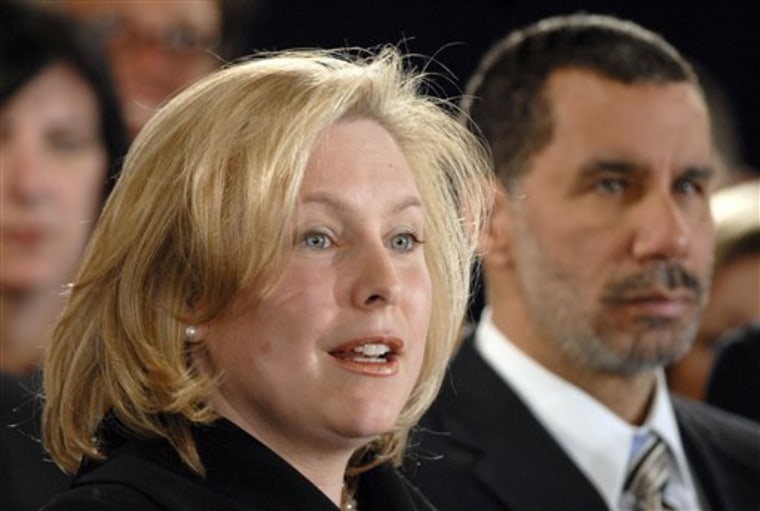By any measure, New York's new Democratic U.S. senator, Kirsten Gillibrand, got off to a rocky start. She was neither a Kennedy nor Clinton, just an unknown appointed by an unpopular governor.
But with a consistent, engaging style and help from powerful allies including President Barack Obama, Gillibrand has moved quickly to quiet her critics and box out potential challengers in her party.
The little-known U.S. representative from upstate New York was appointed to fill Hillary Rodham Clinton's seat in January when the Democratic incumbent became Obama's secretary of state. Gov. David Paterson settled on Gillibrand only after Caroline Kennedy abruptly withdrew from consideration.
Gillibrand's conservative views on guns and immigration drew immediate criticism from more liberal Democrats in the state. Political veterans, including U.S. Reps. Steve Israel, Carolyn McCarthy and Carolyn Maloney loudly threatened to challenge her in 2010.
Primary would be biggest threat
A primary would be Gillibrand's biggest threat in a state where registered Democrats outnumber Republicans 2-to-1. The GOP has yet to get behind a candidate. Former Gov. George Pataki, the last Republican to win statewide in New York, has been approached about running, but has not given an answer.
With Democrats in Washington eager to avoid a costly New York primary battle next year, Gillibrand has found a lot of friends in high places.
Her chief mentor is New York's senior U.S. senator, Charles Schumer, the former chairman of the Democratic Senatorial Campaign Committee and architect of the party's majority in the chamber. He's made Gillibrand's re-election a priority, advising her on strategy and appearing with her in Washington and around the New York.
Obama has even weighed in, calling Israel and asking him not to compete against Gillibrand.
Israel said he bowed of the race at the behest of the president. McCarthy also has taken a pass. Vice President Joe Biden telephoned Maloney this month to discuss the race with her, but she hasn't ruled out a run.
So far only Jonathan Tasini, a little-known labor activist, has announced plans to challenge Gillibrand.
U.S. Sen. Robert Menendez of New Jersey, the current Senate campaign committee chairman, said the committee will work with Gillibrand "to make sure she is well-prepared for her race."
Seen as a rising star
The 42-year old Gillibrand was seen as a rising star after defeating a Republican incumbent, U.S. Rep. John Sweeney, in a conservative Albany-area district in 2006. Two years later, she knocked off a self-funded millionaire who formerly led the state Republican Party.
Her image immediately took a tumble after she emerged as Paterson's choice to replace Clinton, the former first lady and presidential hopeful who lost the White House nomination to Obama.
Paterson was accused of bungling a chance to land a political celebrity in Kennedy, the late President John F. Kennedy's daughter and niece of former U.S. Sen. Robert F. Kennedy, D-N.Y.
Gillibrand, detractors said, was too obscure and conservative for the liberal Democrats who live in the New York City metropolitan area.
To reinforce her standing, Gillibrand has won the backing of unions, elected officials, civil rights activists, including the Rev. Al Sharpton and EMILY's List, which raises money for Democratic female candidates. Gillibrand hopes to use the endorsements as a sort of political firewall.
Gillibrand reported $2.2 million in her Senate treasury at the end of March. That's respectable for newly minted freshman, but a mere down payment in a state where competitive U.S. Senate races can cost $40 million. Gillibrand, a proven fundraiser, said she'll "raise whatever it take to get my message out."
Gillibrand nonetheless remains vulnerable. A Marist Poll taken last month showed she is still unknown to many voters. Just 19 percent in the survey said they thought she was doing an "above average" job. Her weakest numbers came from New York City and its suburbs.
Avoiding hard-line positions
She has tried to distance herself from hard-line positions on guns and illegal immigration which suited her congressional district well but play poorly in more diverse, urban areas.
"We're beginning to develop a good relationship, just like I did with my old district," Gillibrand said of her work across the state.
Gillibrand has also worked hard to be an effective senator.
She has attended more than 100 luncheons, speeches and events, from Long Island to Niagara Falls. The married mother of two young boys has proposed several pieces of family friendly legislation, such as toughening chemical safety standards for baby products.
But her legislative interests are far-ranging. With Schumer, she is pushing to give Caribbean nationals their own origins check box on the census and to keep an NHL team from locating across the Canadian border from Buffalo, home of the Sabres.
The transition has not been seamless, but there are signs of progress. Pollster Lee Miringoff notes that Gillibrand is an energetic Democrat in a deep-blue state with powerful friends and no primary opponent — yet.
"There's been a stick-a-fork-in-her mentality," Miringoff said, "and I suspect that's very premature."
